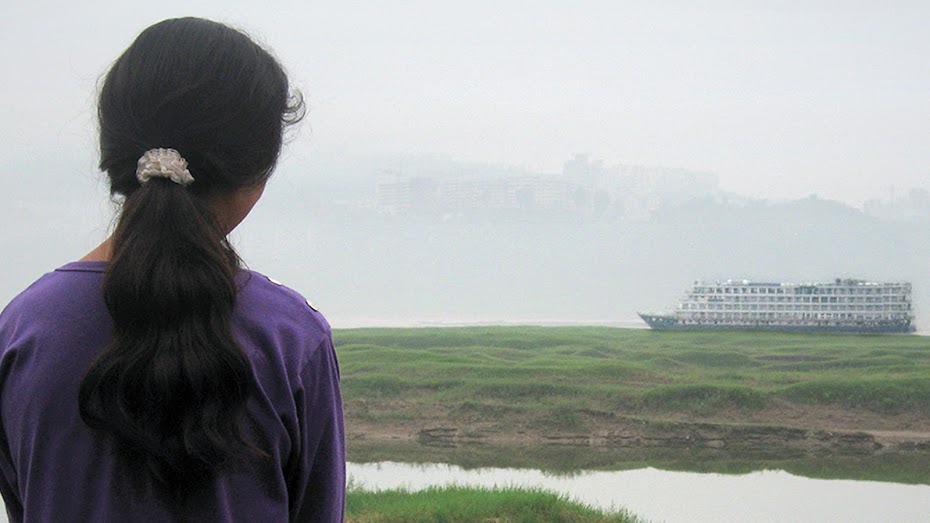DOCUMENTARIES FROM YOUNG CHENG
Yung Chang is a Chinese Canadian film director and part of the collective member directors of Canadian film production firm EyeSteelFilm
Yung Chang, made his feature documentary, Up The Yangtze in 2007. The film used China's highly contested Three Gorges Dam as a dramatic backdrop for a moving and richly detailed narrative of a peasant family negotiating unprecedented historic changes. "Up The Yangtze" played at numerous festivals and was one of the top-grossing documentary box office releases in 2008. China Heavyweight is Chang's second film
Yung Chang-IMDB
Up The Yangtze (2007)
Director Yung Chang uses the construction of China's massive Three Gorges Dam as a springboard to better understanding the social hierarchies and changing times in his homeland in this documentary focusing on the luxury cruise ship that carries predominately Western tourists down the Yangtze River.
Constructed as a symbol of modern progress in China, the Three Gorges Dam has forced millions of common people out of their ancestral homes, and will soon swallow up numerous nearby towns and villages. Despite the fact that the government has funded alterative housing for the dislocated families, however, many citizens make their way to higher ground feeling as if they have been duped by the powers that be. In order to truly understand how this affects the people, Chang focuses on telling the stories of middle-class scion Chen Bo Yu (renamed "Jerry" by the cruise line) and Yu Shui (who answers to the call of "Cindy" while on duty).
In his masterful and haunting documentary "Up the Yangtze," Yung Chang shows the old China drowning helplessly under the weight of the new.
Looming over the film, physically and metaphorically, is the nearly complete Three Gorges Dam in the interior province of Hubei; begun in 1994 and scheduled for completion in 2011, it's the largest hydroelectric project in history, and China's most ambitious public works effort since the Great Wall. Some scientists theorize the collected weight of water may affect the earth's rotational axis.
The environmental impact of Three Gorges has been widely reported, but Chang is more concerned with the social costs. Some 1.4 million residents have been relocated by the Chinese government to date, with the total number of those affected estimated at up to 4 million, or 1.5 percent of the provincial population. "Up the Yangtze" skips over the enormity of numbers, though, and shows us a handful of people desperately trying to adapt.
"Up the Yangtze" is impassioned reportage masquerading as poetry, and while the film rarely explicitly addresses government policy, there's not one frame that isn't political. That includes the wordless climactic time-lapse sequence in which the rising river swallows houses, trees, land, and lives, leaving behind a vast inner sea. The movie strains to listen to the ghosts beneath the surface.
Boston Globe
China Heavyweight (2012)

Yung Chang returns to China for another riveting documentary on that country's ever-changing economic landscape-this time through the lens of sports. In China Heavyweight, Chang follows the charismatic Qi Moxiang, a former boxing star and state coach who recruits young fighting talent from the impoverished farms and villages across Sichuan province.
A select few boys (and girls) are sent to national training centers, with the hope of discovering China's next Olympic heroes. But will these potential boxing champions leave it all behind to be the next Mike Tyson? Their rigorous training, teenage trials and family tribulations are expertly intertwined with Coach Qi's own desire to get back in the ring for one more shot at victoryCanadian helmer Yung Chang delivers another artfully downbeat chronicle of mainland life with "China Heavyweight," an intimate and affecting account of two aspiring boxers from the sticks training under the same hard-working coach. As he did in his Three Gorges Dam docu "Up the Yangtze," Chang examines how a particular strain of Western culture promises opportunity and prosperity for Chinese youth, even as it remains a continual source of intergenerational tension. Fluidly lensed and shaped to generate the immersive feel and texture of a narrative feature, this engrossing, arguably too-short documentary should last a few rounds in theatrical release.
Variety
MORE ABOUT FILM
by Lixin Fan
Lixin Fan (範立欣, Fàn Lìxīn) is a Montreal, Canada-based documentary film director with the Canadian production company EyeSteelFilm and previously a producer/journalist at
China’s state broadcaster CCTV.

Every spring, China's cities are plunged into chaos as 130 million migrant workers journey to their home villages for the New Year's holiday. This mass exodus is the world's largest human migration-an epic spectacle that reveals a country tragically caught between its rural past and industrial future. Working over several years in classic verité style Chinese-Canadian filmmaker Lixin Fan (with the producers of the award-winning hit documentary Up the Yangtze) travels with one couple who have embarked on this annual trek for almost two decades. Like so many of China's rural poor, Changhua and Sugin Zhang left behind their two infant children for grueling factory jobs. Their daughter Qin-now a restless and rebellious teenager-both bitterly resents their absence and longs for her own freedom away from school, much to the utter devastation of her parents. Emotionally engaging and starkly beautiful, Last Train Home's intimate observation of one fractured family sheds light on the human cost of China's ascendance as an economic superpower.-- (C) Zeitgeist Films
This is inevitable: Painful social conflict will arise between those Chinese citizens who produce consumer goods for the world, and those Chinese who want to consume them. “Last Train Home,” an extraordinary documentary, watches that conflict play out over a period of three years in one family. It's one of those extraordinary films, like “Hoop Dreams,” that tells a story the makers could not possibly have anticipated in advance. It works like stunning, grieving fiction.











.jpg)